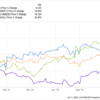Since Wall Street’s major stock indexes bottomed out in October 2022, the floodgates have been wide open for optimists. The mature stock-driven Dow Jones Industrial Average, benchmark S&P 500, and innovation-powered Nasdaq Composite have all rocketed to record-closing highs this year.
However, the “Magnificent Seven” deserve most of the credit for lifting Wall Street to new heights. All seven members of the Magnificent Seven, which includes artificial intelligence (AI) behemoth Nvidia, tech juggernaut Apple, and software colossus Microsoft currently sport, or once obtained, a trillion-dollar market cap.

Professional and everyday investors are captivated with finding the next company, or set of companies, that can join this exclusive trillion-dollar club.
While nothing is set in stone, four high-growth companies, with perceived-to-be sustained competitive advantages and current market valuations of less than $100 billion, have the necessary tools and intangibles to become trillion-dollar businesses by 2040 and join the likes of Nvidia, Apple, and Microsoft.
Palantir Technologies (current market cap of $62 billion)
This first hypergrowth stock that has a reasonable pathway to become a trillion-dollar company over the next 16 years is AI-inspired data-mining specialist Palantir Technologies (NYSE: PLTR).
What makes Palantir so special is that its services can’t be duplicated by any other business at scale. The company’s AI-driven Gotham platform handles data collection and mission-planning, among other tasks, for federal governments. Palantir typically lands four- or five-year government contracts that produce predictable sales and cash flow.
But there’s also a tangible ceiling to be expected with Gotham. Since Palantir’s management team won’t allow certain entities to access its Gotham platform (e.g., China), there’s only so much of a growth runway for this time-tested operating segment.
The lion’s share of Palantir’s future growth is liable to come from its Foundry platform. This is its enterprise-facing service designed to help businesses better understand their data so they can streamline their operations. As of March 31, the company had 427 commercial customers worldwide, which was up 53% from the prior-year period. In other words, Foundry is still in its very early stages of expansion.
If Palantir can attract larger businesses to use Foundry, there’s a real chance it can sustain a 20% (or greater) sales growth rate.
Airbnb (current market cap of $93 billion)
A second fast-paced company with a sub-$100 billion market cap that has a realistic shot at attaining a $1 trillion valuation by 2040 is stay-and-hosting platform Airbnb (NASDAQ: ABNB).
The travel industry has been ripe for disruption for decades, and Airbnb looks to have a variety of solutions. Its stay-and-hosting marketplace is directly taking on the traditional hotel industry. After handling roughly 140 million bookings in 2018, Airbnb is pacing more than 500 million nights and experiences booked in 2024, based on the 132.6 million recorded in the first quarter.
What’s incredible to think about is that Airbnb’s marketplace only features “more than 5 million hosts.” With somewhere in the neighborhood of 1 billion homes worldwide, there’s room for massive expansion in the number of platform hosts in the coming years.
However, Airbnb is about far more than just hotel disruption. Travel is an estimated $11.1 trillion industry (as of 2024), and Airbnb can easily edge its way into other tourism channels to gain a sizable piece of the pie. In addition to its Experiences segment, which works with local experts to lead travelers on adventures, Airbnb can, for example, partner with airlines, restaurants, and theme parks to hang onto a greater percentage of what travelers spend.
Keeping travelers within its ecosystem of products and services is the game-changer that could make Airbnb the travel industry’s most-valuable company.

Sea Limited (current market cap of $42 billion)
The third supercharged growth stock that has the necessary catalysts to become a trillion-dollar company by the start of the 2040s is Singapore-based conglomerate Sea Limited (NYSE: SE).
The “recipe” that could lift Sea from a reasonable $42 billion valuation to a cool $1 trillion in 16 years involves all three of its operating segments firing on all cylinders.
For the moment, its digital entertainment division (known as “Garena”) is responsible for the lion’s share of its adjusted earnings before interest, taxes, depreciation, and amortization (EBITDA). Free Fire remains one of the world’s most-popular mobile games, with 8.2% of Garena’s nearly 595 million quarterly active users paying to play its mobile games during the first quarter. This is a considerably higher pay-to-play rate than the industry average.
The second segment that can drive significant growth is SeaMoney, the company’s digital financial services operations. Many of the Southeast Asian countries Sea offers its services in are chronically underbanked. Providing basic financial services in emerging markets can be SeaMoney’s ticket to rapid sales and profit growth.
But the game-changer of all segments is likely to be e-commerce platform Shopee. A burgeoning middle class in Southeastern Asia and Brazil has welcomed Shopee with open arms. After $10.3 billion in gross merchandise value (GMV) traversed its site in 2018, Sea’s e-commerce site is pacing $94.4 billion in GMV in 2024, based on its first-quarter results.
PayPal Holdings (current market cap of $63 billion)
A fourth hypergrowth stock that can, by 2040, stand side-by-side with the likes of Nvidia, Apple, and Microsoft as trillion-dollar businesses, is financial technology (“fintech”) leader PayPal Holdings (NASDAQ: PYPL).
Although PayPal is contending with increasing competition in the digital payment space, a majority of its most-important key performance indicators are moving in the right direction. For instance, total payment volume (TPV) grew by 14% on a constant-currency basis (i.e., excluding currency movements) to almost $404 billion in the March-ended quarter. No matter what’s been thrown PayPal’s way, payment transactions and TPV have consistently grown by a double-digit percentage.
What’s even more important for PayPal’s future is that active accounts are becoming more engaged. At the end of 2020, the average active user had completed 40.9 payments over the trailing-12-month (TTM) period. But as of the end of March 2024, this had risen to 60 payments over the TTM for active accounts. If engagement among active accounts continues to improve, PayPal’s gross profit should keep rising.
Don’t overlook the role relatively new CEO Alex Chriss can play, either. Chriss was formerly the head of Intuit‘s Small Business segment, so he knows a thing or two about innovation, cost control, and what small merchants want. Chriss has tightened his company’s belt in some areas, all while unveiling a new advertising platform that should benefit from long-winded economic expansions.
We’re still in the very early innings of digital payment adoption and expansion, which bodes well for PayPal’s future.
Should you invest $1,000 in Palantir Technologies right now?
Before you buy stock in Palantir Technologies, consider this:
The Motley Fool Stock Advisor analyst team just identified what they believe are the 10 best stocks for investors to buy now… and Palantir Technologies wasn’t one of them. The 10 stocks that made the cut could produce monster returns in the coming years.
Consider when Nvidia made this list on April 15, 2005… if you invested $1,000 at the time of our recommendation, you’d have $791,929!*
Stock Advisor provides investors with an easy-to-follow blueprint for success, including guidance on building a portfolio, regular updates from analysts, and two new stock picks each month. The Stock Advisor service has more than quadrupled the return of S&P 500 since 2002*.
*Stock Advisor returns as of July 8, 2024
Sean Williams has positions in PayPal. The Motley Fool has positions in and recommends Airbnb, Apple, Intuit, Microsoft, Nvidia, Palantir Technologies, PayPal, and Sea Limited. The Motley Fool recommends the following options: long January 2026 $395 calls on Microsoft, short January 2026 $405 calls on Microsoft, and short September 2024 $62.50 calls on PayPal. The Motley Fool has a disclosure policy.
Prediction: 4 Sub-$100 Billion Hypergrowth Stocks That Can Join Nvidia, Apple, and Microsoft as Trillion-Dollar Companies by 2040 was originally published by The Motley Fool
EMEA Tribune is not involved in this news article, it is taken from our partners and or from the News Agencies. Copyright and Credit go to the News Agencies, email news@emeatribune.com Follow our WhatsApp verified Channel





